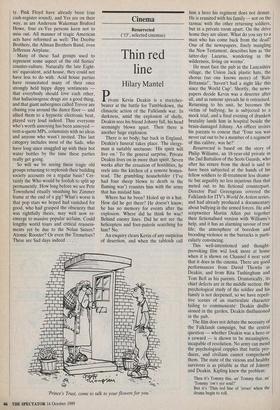Cinema
Resurrected
(`15', selected cinemas)
Thin red line
Hilary Mantel
Private Kevin Deakin is a stretcher- bearer at the battle for Tumbledown, the climactic action of the Falklands war. In darkness, amid the explosion of shells, Deakin sees his friend Johnny fall, his head seemingly blown apart. Then there is another huge explosion.
There is no body; but back in England, Deakin's funeral takes place. The clergy- man is suitably unctuous: 'His spirit will live on.' To the general surprise, Private Deakin lives on in more than spirit. Seven weeks after the cessation of hostilities, he reels into the kitchen of a remote homes- tead. The grumbling householder (I've had four sheep blown to death in the flaming war') reunites him with the army that has mislaid him.
Where has he been? Holed up in a hut. How did he get there? He doesn't know; he has no memory for events after the explosion. Where did he think he was? Behind enemy lines. Did he not see the helicopters and foot-patrols searching for him? No.
An enquiry clears Kevin of any suspicion of desertion, and when the tabloids call him a hero his regiment does not demur. He is reunited with his family — not on the tarmac with the other returning soldiers, but in a private room apart. On the drive home they are silent. What do you say to a man who has come back from the dead? One of the newspapers, finely mangling the New Testament, describes him as 'the latter-day Lazarus, wandering in the wilderness, living on worms'.
He must face the pub in the Lancashire village, the Union Jack plastic hats, the chorus (no one knows more) of 'Rule Britannia!', 'haven't had a night like this since the World Cup'. Shortly, the news- papers decide Kevin was a deserter after all, and as rumour spreads he is ostracised. Returning to his unit, he becomes the victim of bullying; he is subjected to a mock trial, and a final evening of drunken brutality lands him in hospital beside the brain-damaged Johnny. An officer invites his parents to concur that 'Your son was never cut out to be a member of a regiment of this calibre, was he?'
Resurrected is based on the story of Philip Williams, an 18-year-old private in the 2nd Battalion of the Scots Guards, who after his return from the dead is said to have been subjected at the hands of his fellow soldiers to ill-treatment less drama- tic but arguably no less injurious than that meted out to his fictional counterpart. Director Paul Greengrass covered the Falklands for ITV's World In Action series, and had already produced a documentary about bullying in the armed forces. He and scriptwriter Martin Allen put together their fictionalised version with Williams's help, and it has an alarming savour of true life; the atmosphere of boredom and brooding violence in the barracks is parti- cularly convincing.
This well-intentioned and thought- provoking film will look more at home when it is shown on Channel 4 next year that it does in the cinema. There are good performances from David Thewlis as Deakin, and from Rita Tushingham and Tom Bell as his parents. Dramatically, its chief defects are in the middle section; the psychological study of the soldier and his family is not deepened, so we have repeti- tive scenes of an inarticulate character failing to communicate: Deakin disillu- sioned in the garden, Deakin disillusioned in the pub.
The film does not debate the necessity of the Falklands campaign, but the central question — whether Deakin was a hero or a coward — is shown to be meaningless, incapable of resolution. No army can mend the psychological cripples that battle pro- duces, and civilians cannot comprehend them. The state of the vicious and healthy survivors is as pitiable as that of Johnny and Deakin. Kipling knew the problem: Then it's Tommy this, an' Tommy that, an' 'Tommy 'ow's yer soul?'
But it's 'Thin red line of 'eroes' when the drums begin to roll.


























































 Previous page
Previous page